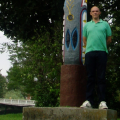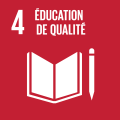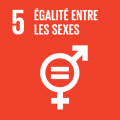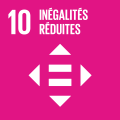
Multiculturalidad, Literatura y Arte: Del Oeste Norteamericano a las aulas
Description
Este Curso de Verano se celebrará de forma presencial y también habrá la posibilidad de participar en directo online a través de ZOOM. Selecciona en el proceso de matrícula cómo vas a participar: presencialmente u online en directo.
El Curso de Verano tiene como objetivo fundamental el de exponer la relevancia y pertinencia de la literatura, la cultura y las artes norteamericanas como ejemplo de la representación de la multiculturalidad y la diversidad racial contemporánea, con el fin último de su aplicación didáctica en el aula. El Curso, dirigido tanto a estudiantes y profesorado del ámbito universitario como a profesorado de Educación Secundaria, propone una aproximación a la realidad socio-étnica norteamericana a través de su producción artística y cultural. De este modo, se pretende abordar la situación socio-histórica de estas comunidades, así como proponer bibliografía de carácter diverso (literatura, cine, música, artes plásticas, Street art), con el fin de que sea empleado en el aula para abordar la multiculturalidad y la diversidad étnica actual. Así, propondremos una aproximación a la producción artística producida por y acerca de comunidades tales como la vasco-americana, la chicana, la afro-americana y/o la nativo-americana. Del mismo modo, expondremos la representación de conceptos tales como “el mito del Oeste” o “la frontera mejicano-americana” en las artes, como paradigma de la multiculturalidad y de la diversidad étnica.
Objectives
Ofrecer una aproximación a la historia y realidad contemporánea de los Estados Unidos de América, en particular al Oeste Norteamericano, y a su diversidad étnica y cultural, como paradigma de lo multicultural.
Exponer una aproximación teórica a la construcción de la diferencia étnica en Estados Unidos, englobada en el marco de los estudios étnicos y de género.
Exponer la relevancia del arte (Literatura, Cine, Televisión, Música, etc) en la representación y transmisión de una realidad diversa y multicultural.
Ofrecer un repositorio de material bibliográfico relacionado con la representación de la multiculturalidad y la diversidad étnica y de género en los Estados Unidos (en particular, en el Oeste Norteamericano), con el fin de que sea empleado en el aula de secundaria.
Proponer una reflexión en torno a la relevancia de la utilización de la producción cultural (literatura, cine, televisión, música) para abordar la diversidad multicultural de las aulas de secundaria en el entorno pedagógico vasco-español actual.
Activity directed to
- University students
- Students not from university
- Teachers
- All public
Program
21-06-2021
Registro
Presentation by the Director of the activity
- Amaya Ibarraran Vigalondo UP/EHU - Profesora Titular Universidad
“La expansión del mito del Oeste y su deconstrucción multicultural“
- David Río Raigadas UPV/EHU - Catedrático Universidad
Break
“Multiculturalidad, etnicidad, y arte: El caso de la frontera mejicano-americana“
- Amaya Ibarraran Vigalondo UPV/EHU - Profesora Titular Universidad
“Multiculturalidad e indigenidad: Los nativos americanos, pioneros de la interculturalidad“
- Aitor Ibarrola Armendáriz Universidad de Deusto - Profesor Titular Universidad
Synthesis
22-06-2021
“Westerns, post-Westerns y multiculturalidad“
- jesus angel González López Universidad de Cantabria - Profesor Titular Universidad
“Cultura popular y multiculturalidad: el cine, la música y el arte chicanos“
- Amaya Ibarraran Vigalondo UPV/EHU - Profesora Titular Universidad
Break
“Multiculturalidad y música popular en la Cultura Norteamericana“
- Angel Chaparro Sainz UPV/EHU - Profesor Adjunto
Synthesis
23-06-2021
“Far Westeko Ahotsak: Cine, Arte, Música“
- Monika Madinabeitia Medrano Mondragon Unibertsitatea - Profesora Contratada
“¿El final de los pastores?: La literatura vasco-norteamericana del siglo XXI“
- David Río Raigadas UPV/EHU - Catedrático Universidad
Break
Round table: “Una propuesta pedagógica: el Oeste americano como paradigma la multiculturalidad “
- Amaya Ibarraran Vigalondo UPV/EHU - Profesora TItular Universidad (Moderator)
- jesus angel González López Universidad de Cantabria - Profesor Titular Universidad
- Aitor Ibarrola Armendáriz Universidad de Deusto - Profesor Titular
- Monika Madinabeitia Medrano UPV/EHU - Profesora Contratada
- Angel Chaparro Sainz UPV/EHU - Profesor Adjunto
- David Río Raigadas UPV/EHU - Catedrático Universidad
Closing session
- Amaya Ibarraran Vigalondo UPV/EHU - Profesora Titular Universidad
Directors

Amaya Ibarraran Vigalondo
UPV/EHU
Amaia Ibarraran-Bigalondo is a lecturer o Amaia Ibarraran-Bigalondo is associate professor at the University of the Basque Country, where she teaches contemporary North American Literature and Culture. Her research focuses on the study of Chicana Literature and Culture. Her work has appeared in books, edited books and international journals. Her latest publications include "The New American West: A Journey Across Boundaries in Literature and the Arts" (Routledge, 2020), "Mexican American Women, Dress and Gender: Pachuchas, Chicanas, Cholas" (Routledge, 2019) and the co-editions/editions "The Neglected West" (Portal, 2012), "Transcontinental Reflections on the American West: Words, Images, Sounds beyond Borders" (Portal, 2015). She is a member of the REWEST research group (Research Group in Western American Literature).
Speakers

Angel Chaparro Sainz
Angel Chaparro Sainz was born in Barakaldo, Spain, in 1976. He holds a degree in English Philology from the University of the Basque Country (UPV/EHU) and a Ph.D. from that same university. He is presently teaching at the UPV/EHU in the Translation Studies and in the English Studies programs. His book Parting the Mormon Veil: Phyllis Barber’s Writing was published by the Biblioteca Javier Coy in 2013. He also co-edited the book Transcontinental Reflections on the American West: Words, Images, Sounds beyond Borders in 2015. He has also published in journals such as Miscelánea, Odisea, Lectora, Vasconia or Women’s Studies. His research deals mostly with Western American Literature, Mormon literature, ecocriticism, feminist studies and translation studies, even though he is also interested in a variety of topics dealing with poetry, popular music and minority literatures in general

jesus angel González López
JESÚS ÁNGEL GONZÁLEZ is a professor of English at the University of Cantabria, Spain, where he teaches English and American literature. He holds an M.A. in Spanish from the Pennsylvania State University and a Ph.D. in English from the University of Salamanca, Spain. He has published La narrativa popular de Dashiell Hammett: Pulps, Cine y Cómics (Valencia University Press, 2002), co-edited The Invention of Illusions: International Perspectives on Paul Auster (Cambridge Scholars, 2011) and written a number of articles on American Literature and Film, which have been published in Literature/Film Quarterly, Comparative American Studies, The Journal of Popular Culture, Atlantis, Western American Literature and The Journal of Transnational American Studies. His most recent research deals with the American West and its effects on American and international culture, literature and film.

Aitor Ibarrola Armendáriz
Aitor Ibarrola-Armendariz teaches courses in ethnic relations, diversity management, academic writing and film adaptation in the Modern Languages and Basque Studies Department of the University of Deusto, Bilbao. He has published articles [in Atlantis, IJES, Miscelánea, Revista Chilena de Literatura, etc.] and edited volumes [Fiction and Ethnicity (1995), Entre dos mundos (2004), Migrations in a Global Context (2007), On the Move: Glancing Backwards to Build a Future in English Studies (2016] on minority and immigrant narratives and processes of cultural hybridisation. He has been the Director of the Erasmus Mundus MA Programme in Migrations and Social Cohesion (2010-14) and Head of the Modern Languages and Basque Studies Dept. (2012-15) in the School of Social Sciences and Humanities at the University of Deusto. Currently, he is preparing a book on trauma and ethnicity, and also involved on a project on diasporic identities.

Monika Madinabeitia Medrano
Monika Madinabeitia is an associate professor at the Faculty of Humanities and Education Sciences (Mondragon University). She is currently the co-coordinator of the recently launched degree Global Digital Humanities, which is located in Zorrotzaurre, Bilbao. She published the illustrated book Petra, My Basque Grandmother in 2018. Her main research areas are identity and e/migration, with an emphasis on the Basque American diaspora in the US West. Her teaching mainly focuses on culture and identity. She has been teaching Basque Culture to international students since 2007 and has participated in different courses and lectures held by Etxepare Institute. Madinabeitia was the guest lecturer at this year´s Eloise Garmendia Chair (2021) and was also one of the main organizers of the international seminar UniverCity: Educating For and With the City, in Bilbao (2019). She is now working on the second edition of UniverCity.
David Río Raigadas
DAVID RIO is Professor of American Literature at the University of the Basque Country (UPV/EHU) in Vitoria-Gasteiz (Spain). He is the author of El proceso de la violencia en la narrativa de Robert Penn Warren (1995), Robert Laxalt: The Voice of the Basques in American Literature (2007) and New Literary Portraits of the American West: Contemporary Nevada Fiction (2014). He has also co-edited five volumes on the literature of the American West and the special issue of the journal Western American Literature on “Writing the Global Western” (2019). David Rio coordinates an international research group (REWEST) specialized in the literature and culture of the American West.
Summary
Conclusions sent by the direction of the Summer Course
Sustainable development goals
Agenda 2030 is the new international development agenda approved in September 2015 by the United Nations. This agenda aims to be an instrument to favour sustainable human development all over the planet, and its main pillars are the eradication of poverty, a reduction in equality and vulnerability and fostering sustainability. It is a unique opportunity to transform the world up to 2030 and guarantee human rights for all.

4 - Quality education
Guarantee quality education that is inclusive and equitable and foster opportunities for lifelong learning for everyone. Key issues: free-of-charge, equitable and quality education, access to higher education and training on an equal basis, education for sustainable development, suitable education centres for persons with disabilities, and safe, non-violent and efficient learning environments.
More information
5 - Gender equality
Achieve gender equality and empower all women and young girls. Key issues: the end of all forms of discrimination and violence, recognition of unpaid care and domestic work, shared responsibility, equal opportunities, full and effective participation in reproductive rights, equal rights vis-à-vis economic resources, access to land and other assets and ownership.
More information
10 - Reduced inequalities
Reduce inequality in countries and between them. Key issues: promotion of the social, economic and political inclusion of all people, equal opportunities, fiscal, wage and social protection policies to favour equality, migration and the policies that affect it, official assistance for the development, regulation and supervision of world institutions and markets.
More information






